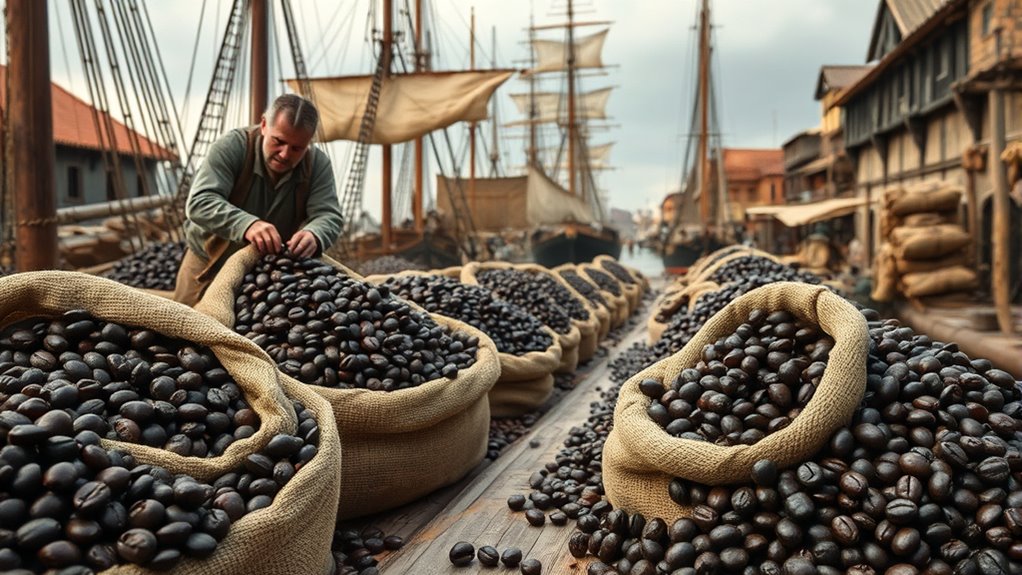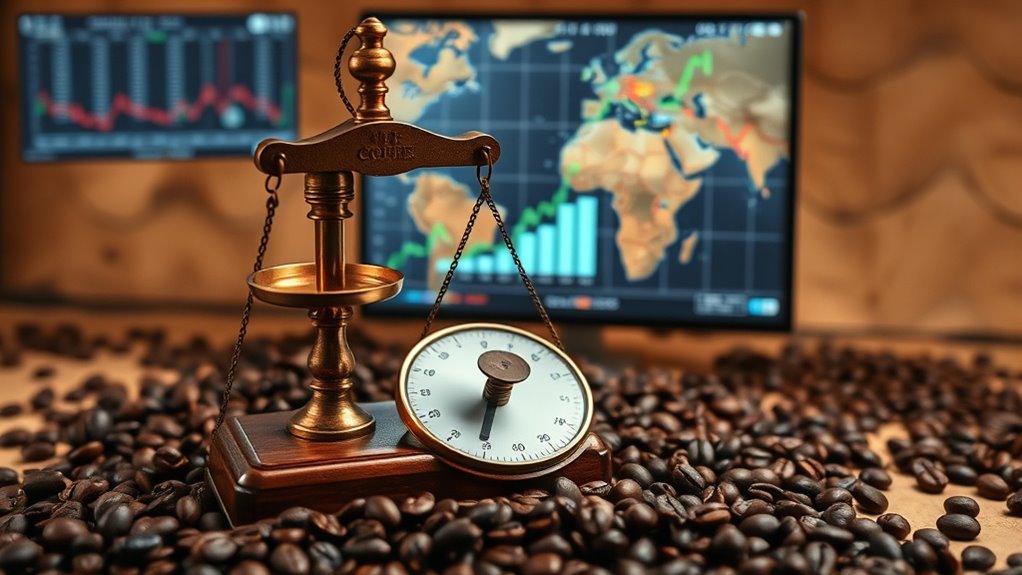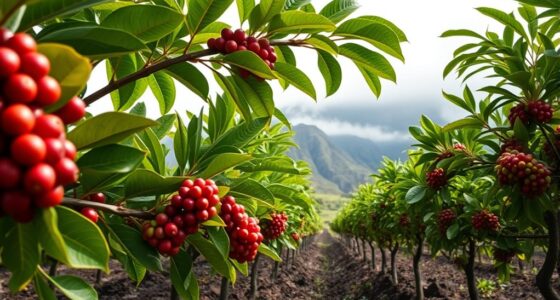The global coffee commodity has transformed from colonial trade routes in the 18th century to today’s complex markets driven by environmental, economic, and regulatory factors. You see how coffee travels across continents, connecting farmers, traders, and consumers worldwide. Challenges like climate change, sustainability issues, and market regulations shape the industry’s landscape. If you explore further, you’ll discover how these historical shifts influence current practices and future opportunities within the coffee world.
Key Takeaways
- Coffee’s global journey began in the 18th century as a colonial commodity controlled by European powers.
- International trade expansion connected producers, traders, and consumers across continents and cultures.
- Market regulations and certifications influence the supply chain, often favoring large corporations over smallholders.
- Environmental and sustainability challenges affect coffee farming, shaping both historical and modern trade practices.
- Advances in technology and climate resilience efforts aim to create a more equitable and sustainable modern coffee market.

Have you ever wondered how coffee from distant countries reaches your morning cup? It’s a journey that spans continents, economies, and cultures, shaped by a complex web of trade and market forces. As you enjoy that warm brew, consider the challenges faced by producers and traders alike. Sustainability challenges, for instance, are a significant hurdle. Coffee farming often occurs in regions vulnerable to climate change, deforestation, and resource depletion. Farmers struggle to maintain yields while protecting their environment, and many lack access to sustainable practices that could improve their livelihoods. These issues aren’t just environmental—they affect economic stability too. When farmers can’t produce enough or face decreasing prices, their ability to invest in better practices diminishes, creating a cycle of hardship.
Sustainability challenges in coffee farming threaten both the environment and farmers’ livelihoods.
Trading regulations add another layer of complexity. Governments and international bodies impose rules that govern coffee trade, aiming to ensure quality, fair practices, and market stability. However, these regulations can sometimes hinder small-scale farmers or emerging producers, making it harder for them to access global markets. Tariffs, export quotas, and certification requirements often favor larger corporations or well-established trading companies, leaving smallholders at a disadvantage. Navigating these regulations requires resources, expertise, and connections that many small farmers simply don’t have. This imbalance can limit diversity within the global coffee market and concentrate power among a few dominant players.
The evolution of the coffee trade from the 18th century onward reflects these ongoing struggles. Back then, coffee was primarily a colonial commodity, with European powers controlling plantations and trade routes. Over time, international trade expanded, and markets grew more interconnected. Yet, despite progress, issues like sustainability challenges and trading regulations still influence the industry today. Modern markets are now more aware of the importance of ethical sourcing and environmental responsibility, but implementing these principles remains complex. Certification schemes like Fair Trade and Rainforest Alliance aim to address these issues, but they also introduce additional compliance hurdles for producers. Additionally, the development of high-tech cultivation methods offers new opportunities for improving yields sustainably, but adoption remains uneven. Furthermore, ongoing research into climate-resilient crops provides hope for adapting to changing weather patterns and securing future supply.
As you sip your coffee, know that the journey from farm to cup is shaped by these intricate factors. The global coffee commodity has come a long way, but it continues to face hurdles rooted in sustainability and regulation. Efforts to improve transparency, fair trade practices, and environmentally friendly cultivation are crucial for ensuring that future coffee is not only delicious but also equitable and sustainable. Your daily coffee ritual can be a small but meaningful act of support for positive change in this challenging yet fascinating industry.
Frequently Asked Questions
How Does Climate Change Affect Coffee Production Worldwide?
Climate change impacts coffee production by increasing extreme weather events like droughts and storms, which threaten crop health. You can help by supporting sustainable farming practices that boost climate resilience, ensuring farmers adapt to changing conditions. These practices protect coffee plants from climate variability, securing future harvests. Ultimately, addressing climate change helps maintain coffee supply, supports farmers, and preserves this beloved crop for generations to come.
What Are the Ethical Considerations in Coffee Trading Practices?
You should consider ethical issues in coffee trading, like ensuring fair treatment for farmers and workers. Fair Trade practices help secure better wages and working conditions, promoting sustainability. You need to examine the supply chain carefully, making sure it’s transparent and free from exploitation. By supporting ethical trading, you help improve livelihoods and encourage responsible production, fostering a more equitable global coffee market.
How Do Coffee Prices Influence Developing Economies?
Imagine a ripple effect—when coffee prices rise or fall, your developing economy feels it deeply. You see, stable prices support economic stability and improve farmer livelihoods, boosting local growth. But volatile prices threaten this harmony, risking unemployment and poverty. You hold the power to influence this cycle, making fair pricing essential for a resilient, thriving economy where farmers prosper and communities flourish.
What Innovations Are Shaping the Future of Coffee Cultivation?
You’re curious about innovations shaping coffee cultivation’s future. Sustainable farming practices are becoming essential, helping protect the environment and improve crop resilience. Technological advancements like drone monitoring, precision agriculture, and new pest management tools boost efficiency and yield quality. These innovations enable farmers to adapt to climate change, reduce resource use, and produce high-quality coffee more sustainably, ensuring the industry’s growth and environmental health for years to come.
How Does Coffee Consumption Impact Global Health Trends?
It’s no coincidence that coffee consumption influences global health trends. You might enjoy its energizing effects, but beware of coffee addiction that can lead to anxiety or sleep issues. On the flip side, moderate coffee intake offers health benefits like antioxidants and improved cognitive function. Your daily coffee habit impacts not only your wellness but also broader health patterns worldwide, shaping how societies approach nutrition and lifestyle choices.
Conclusion
You see, the global coffee commodity connects history and modern markets, shaping economies and cultures alike. It fuels your mornings, drives your economies, and reflects your world’s interconnectedness. From the 18th-century trade routes to today’s global supply chains, coffee’s journey reminds you of the power of trade, the importance of sustainability, and your role in supporting ethical practices. Embrace this knowledge, recognize your influence, and choose consciously—because coffee is more than a beverage; it’s a global story.









